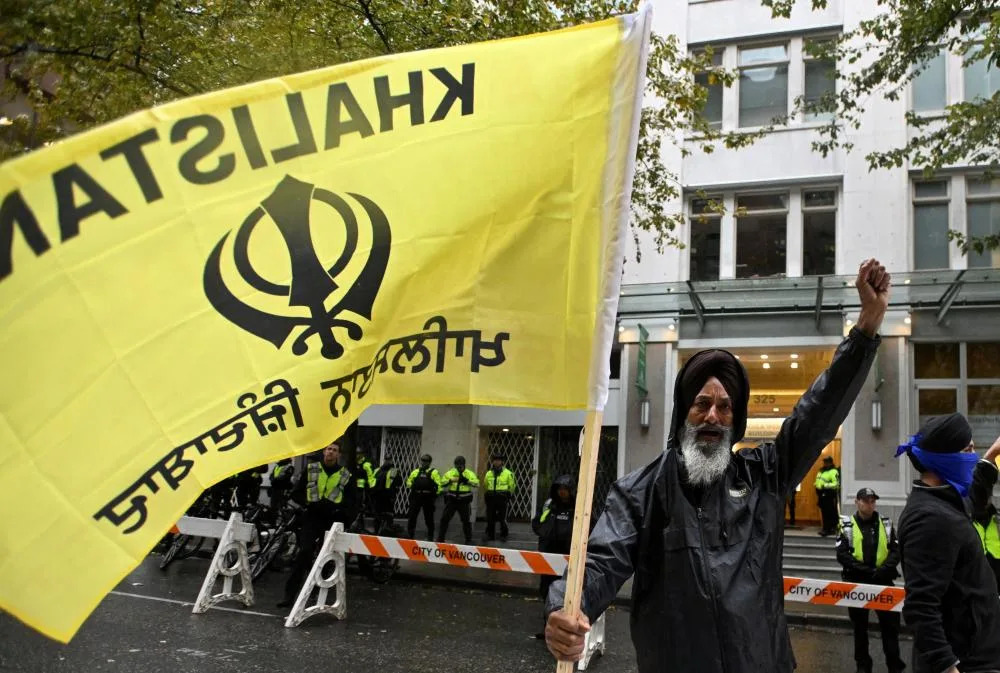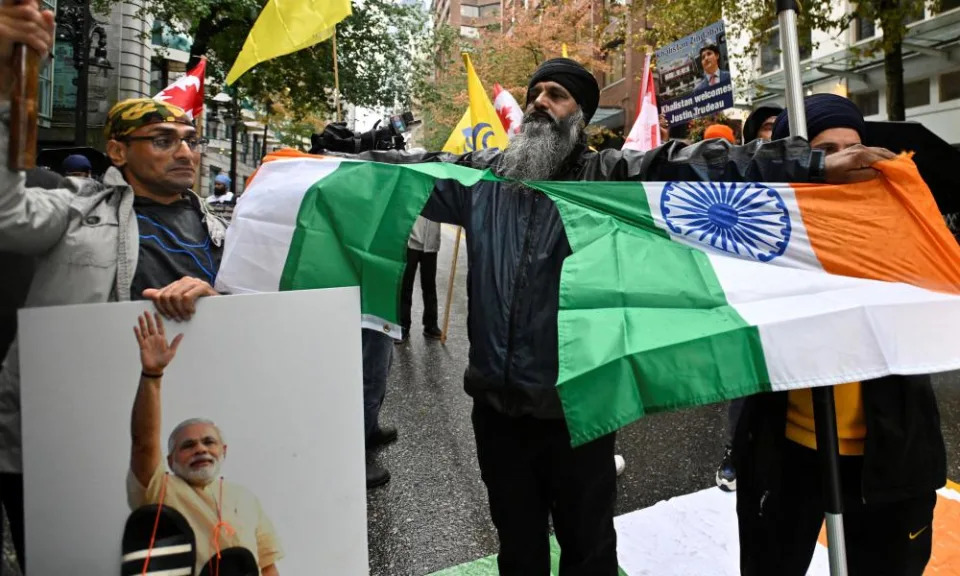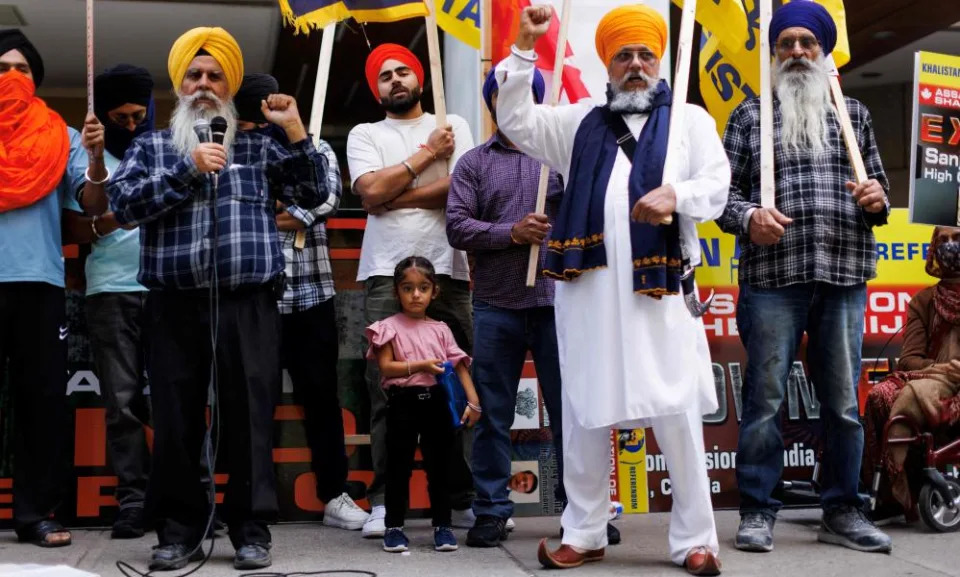Christian Science Monitor's Editorial Board
Wed, September 27, 2023
A bit of shocking news last week forced much of the world to study up on a long-simmering rift in India. Canada accused the Indian government of killing a Canadian citizen near Vancouver who was a prominent activist for an independent Sikh state in his native homeland. While much of the focus has been on Sikh separatists and the diplomatic fallout for India, another spotlight turned on Punjab, the Indian state where Sikhs are in the majority.
There the separatist sentiments that fueled a decade of violence between Sikhs and the state half a century ago have significantly diminished. Instead, many of today’s Sikhs are bridging divides, joining hands with Hindus to restore historic Muslim mosques in Punjabi villages. Some of the funding comes from Sikhs living abroad. Sikh and Hindu families have donated land where new mosques now stand.
These projects – more than 165 so far, according to one Islamic association’s count – demonstrate that religions can lay a foundation for unity by practicing their shared tenets, such as meekness and sincerity. “This kind of brotherhood should prevail across India,” Mohammad Mursalin, a resident of the Punjabi village of Kutba Bamaniya, told Religion Unplugged. “Love must be nurtured, and animosity must dissolve. ... All religions emphasize love; none advocate hate.”
The mosque-building marks a healing counterpoint to the lingering tense relations between Sikhs and India’s nationalist Hindu government. Many Sikhs living abroad still worry they are being surveilled by Indian intelligence services, yet even “hard-core faith groups” in the Sikh diaspora have become apolitical, says Gurharpal Singh, an emeritus professor at the University of London’s School of Oriental and African Studies. The reason for that shift is significant. “They’ve become much more spiritually oriented,” he told The New Yorker last week.
That coincides with a prevailing sense of spiritual accommodation at home. A comprehensive Pew Research poll on religious tolerance in India in 2021 found that 95% of Sikhs feel very proud to be Indian. Some 70% of Sikhs said a person who disrespects India cannot be a Sikh, while 82% of Sikhs said they feel very free to practice their religion.
As new mosques rise, the community affections they represent may be aiding calls for a formal process of reconciliation to address the violence against Sikhs during the 1980s, especially now amid rising Hindu nationalism under Prime Minister Narendra Modi. Erasing communal divisions, wrote Dharamvira Gandhi, a Hindu former member of Parliament from Punjab, in a newspaper opinion piece, requires repentance, forgiveness, “large-heartedness and broad-mindedness.” Those qualities are consistent with Sikhism’s core tenets of equality, humility, and love-inspired service to others.
It isn’t just mosques. The unity felt in many Punjabi communities has led to shared religious festivals and joint restoration projects of historically significant Hindu and Sikh temples. Such actions are solvents for the fears and suspicions that now have set two democracies at odds with each other.
csmonitor.com
‘Whether it costs our lives or not’: killing of Canadian Sikh leader reignites historic fight
Leyland Cecco in Toronto and Sarah Berman in Vancouver
THE GUARDIAN
Wed, September 27, 2023 at 4:30 AM MDT·6 min read
118

Photograph: Jennifer Gauthier/Reuters
Yellow and blue smoke filled the air as protesters in Vancouver tried setting fire to a damp Indian flag. As the flame eventually took hold, people in the crowd waved Sikh separatist flags and chanted calls for the expulsion of India’s top diplomat in Canada.
Tuesday’s protest outside a heavily guarded Indian consulate came a week after Justin Trudeau, the prime minister, told parliament his government had seen “credible allegations” that India was responsible for the fatal shooting of Hardeep Singh Nijjar, a prominent Canadian Sikh leader.
Related: ‘Very messy’: India-Canada row over Sikh killing causes diplomatic shock waves
Amid the pounding of drums and shouts from protesters, the activist Harkeerat Kaur told the crowd that Nijjar’s final words to temple worshippers had been a plea to participate in an upcoming vote calling for an independent Sikh homeland, Khalistan: “[He] stated … we should vow to participate in the peaceful Khalistan referendum. We believe in the ballot.”
Since his death in June, Nijjar has been praised by his community as a martyr – and labelled a terrorist by India. The feuding over his legacy, and mounting concern over what Canada’s government claims was an extrajudicial murder on its soil, has refocused attention on Canada’s Sikh diaspora, their longstanding grievances with India – and the Sikh separatist cause.
Canada is home to the largest Sikh community outside India. Despite a long and layered history in the country, many Canadian Sikhs identify with a sense of historical mistreatment at the hands of both British colonial and post-independence governments in India, said Satwinder Bains, the director of South Asian studies at the University of the Fraser Valley. “They’ve felt those frustrations have never been resolved through the justice system, nor through a parliamentary system. They feel like they’ve tried everything,” she said.
Over generations, some have cultivated hope that Sikhs might one day claim a portion of the Punjab region as their own.
That dream has a long – and violent – history. Beginning around partition in the 1940s, the movement transformed into an armed insurgency in the 1980s, under the leadership of Jarnail Singh Bhindranwale.

The Indian flag is torn during a protest outside India’s consulate in Vancouver, British Columbia, Canada on 25 September 2023. Photograph: Jennifer Gauthier/Reuters
In 1984, the Sikh leader, who stood accused of orchestrating a series of attacks on Hindus in Punjab, sought refuge in Amritsar’s Golden Temple alongside other militants.
The Indian army ordered Operation Blue Star, an attack that led to the killing of 400 Sikhs in the temple, many of whom were pilgrims. In retaliation, the bodyguards for Indira Gandhi, the prime minister, shot her dead, triggering anti-Sikh pogroms that killed more than 3,000 people, with little consequence for the attackers.
“It was a horrific time. And in those moments, the idea of Khalistan, of a safe haven for Sikhs, really meant something,” said Neilesh Bose, an associate professor of history at the University of Victoria.
In 1985, Khalistani militants in Canada targeted two Air India flights, widely seen as revenge for Operation Blue Star. A bomb on Air India flight 182 exploded off the coast of Ireland, killing all 329 people onboard, including 268 Canadian citizens, 27 British citizens and 24 Indian citizens in the worst act of aviation terrorism before the September 11 attacks. The second bomb exploded in the Tokyo airport, killing two baggage handlers. The attacks led to discrimination against Sikh men, identifiable by their turbans, even though many had little interest in the Khalistan cause.
“Punjabi Sikhs in Canada were often seen as enemies of the state, targeted by police and seen as responsible for this attack,” said Bose, adding that both the bombings and public backlash changed how the Sikh diaspora saw itself in the broader Canadian public. “These events – 1984, the Air India bombing – they’re inescapable for so many in the Sikh community. Everybody lives in this context of these moments, and these inescapable legacies.”
The Khalistan movement is banned in India, but in Canada generations of Sikh activists have freely advocated for an independent homeland. While political leaders have emphasised the right to free speech and expression in Canada, they have also long courted the Sikh community as a powerful voting bloc.
That has prompted frustration in India, which has accused Canada of turning a blind eye to extremist Khalistani activity and refusing to act on information about potential threats. Before the Air India bombing, the Royal Canadian Mounted Police (RCMP) failed to act on intel from India about plots against airliners, and successive Canadian governments have refused extradition requests of Sikh activists from India.
Indian authorities allege Nijjar was among the Khalistani activists involved in terrorist activity on Canadian soil. They have accused him of organising an arms training camp for Sikh extremists in British Columbia in 2016, being involved in a plot to assassinate a Hindu priest and police officers in Punjab and heading a banned militant organisation, the Khalistani Tiger Force. The allegations, which he denied, were not investigated by the Canadian authorities and remain unproven.
It remains unclear how popular the Khalistan cause is within Canada’s Sikh population. For some, the movement is forever tainted by violence and the painful legacy of the Air India bombing. For others, it represents a powerful way to counter India’s Hindu nationalist government and the growing persecution of religious minorities.
Already this year, thousands in Ontario and British Columbia have cast ballots in a Khalistan referendum, a global diaspora effort as Sikh activists attempt to unify the disparate groups and co-ordinate pressure on the Indian government.
Wed, September 27, 2023 at 4:30 AM MDT·6 min read
118

Photograph: Jennifer Gauthier/Reuters
Yellow and blue smoke filled the air as protesters in Vancouver tried setting fire to a damp Indian flag. As the flame eventually took hold, people in the crowd waved Sikh separatist flags and chanted calls for the expulsion of India’s top diplomat in Canada.
Tuesday’s protest outside a heavily guarded Indian consulate came a week after Justin Trudeau, the prime minister, told parliament his government had seen “credible allegations” that India was responsible for the fatal shooting of Hardeep Singh Nijjar, a prominent Canadian Sikh leader.
Related: ‘Very messy’: India-Canada row over Sikh killing causes diplomatic shock waves
Amid the pounding of drums and shouts from protesters, the activist Harkeerat Kaur told the crowd that Nijjar’s final words to temple worshippers had been a plea to participate in an upcoming vote calling for an independent Sikh homeland, Khalistan: “[He] stated … we should vow to participate in the peaceful Khalistan referendum. We believe in the ballot.”
Since his death in June, Nijjar has been praised by his community as a martyr – and labelled a terrorist by India. The feuding over his legacy, and mounting concern over what Canada’s government claims was an extrajudicial murder on its soil, has refocused attention on Canada’s Sikh diaspora, their longstanding grievances with India – and the Sikh separatist cause.
Canada is home to the largest Sikh community outside India. Despite a long and layered history in the country, many Canadian Sikhs identify with a sense of historical mistreatment at the hands of both British colonial and post-independence governments in India, said Satwinder Bains, the director of South Asian studies at the University of the Fraser Valley. “They’ve felt those frustrations have never been resolved through the justice system, nor through a parliamentary system. They feel like they’ve tried everything,” she said.
Over generations, some have cultivated hope that Sikhs might one day claim a portion of the Punjab region as their own.
That dream has a long – and violent – history. Beginning around partition in the 1940s, the movement transformed into an armed insurgency in the 1980s, under the leadership of Jarnail Singh Bhindranwale.

The Indian flag is torn during a protest outside India’s consulate in Vancouver, British Columbia, Canada on 25 September 2023. Photograph: Jennifer Gauthier/Reuters
In 1984, the Sikh leader, who stood accused of orchestrating a series of attacks on Hindus in Punjab, sought refuge in Amritsar’s Golden Temple alongside other militants.
The Indian army ordered Operation Blue Star, an attack that led to the killing of 400 Sikhs in the temple, many of whom were pilgrims. In retaliation, the bodyguards for Indira Gandhi, the prime minister, shot her dead, triggering anti-Sikh pogroms that killed more than 3,000 people, with little consequence for the attackers.
“It was a horrific time. And in those moments, the idea of Khalistan, of a safe haven for Sikhs, really meant something,” said Neilesh Bose, an associate professor of history at the University of Victoria.
In 1985, Khalistani militants in Canada targeted two Air India flights, widely seen as revenge for Operation Blue Star. A bomb on Air India flight 182 exploded off the coast of Ireland, killing all 329 people onboard, including 268 Canadian citizens, 27 British citizens and 24 Indian citizens in the worst act of aviation terrorism before the September 11 attacks. The second bomb exploded in the Tokyo airport, killing two baggage handlers. The attacks led to discrimination against Sikh men, identifiable by their turbans, even though many had little interest in the Khalistan cause.
“Punjabi Sikhs in Canada were often seen as enemies of the state, targeted by police and seen as responsible for this attack,” said Bose, adding that both the bombings and public backlash changed how the Sikh diaspora saw itself in the broader Canadian public. “These events – 1984, the Air India bombing – they’re inescapable for so many in the Sikh community. Everybody lives in this context of these moments, and these inescapable legacies.”
The Khalistan movement is banned in India, but in Canada generations of Sikh activists have freely advocated for an independent homeland. While political leaders have emphasised the right to free speech and expression in Canada, they have also long courted the Sikh community as a powerful voting bloc.
That has prompted frustration in India, which has accused Canada of turning a blind eye to extremist Khalistani activity and refusing to act on information about potential threats. Before the Air India bombing, the Royal Canadian Mounted Police (RCMP) failed to act on intel from India about plots against airliners, and successive Canadian governments have refused extradition requests of Sikh activists from India.
Indian authorities allege Nijjar was among the Khalistani activists involved in terrorist activity on Canadian soil. They have accused him of organising an arms training camp for Sikh extremists in British Columbia in 2016, being involved in a plot to assassinate a Hindu priest and police officers in Punjab and heading a banned militant organisation, the Khalistani Tiger Force. The allegations, which he denied, were not investigated by the Canadian authorities and remain unproven.
It remains unclear how popular the Khalistan cause is within Canada’s Sikh population. For some, the movement is forever tainted by violence and the painful legacy of the Air India bombing. For others, it represents a powerful way to counter India’s Hindu nationalist government and the growing persecution of religious minorities.
Already this year, thousands in Ontario and British Columbia have cast ballots in a Khalistan referendum, a global diaspora effort as Sikh activists attempt to unify the disparate groups and co-ordinate pressure on the Indian government.

Demonstrators rally in support of Khalistan outside the Indian consulate in Toronto on 25 September 2023. Photograph: Cole Burston/AFP/Getty Images
The ballots come as a younger generation has grown more emboldened and provocative. In June, a Sikh group in the city of Brampton prompted outrage with a parade float depicting the assassination of Indira Gandhi, which included a blood-splattered effigy of the murdered leader.
On posters for the referendum championed by leadership at the Guru Nanak gurdwara where Nijjar was shot dead, his image appears alongside a photo of the architect of the Air India bombing.
Such incidents have infuriated India. But the brazen murder of Nijjar – which reportedly involved at least six men who fired around 50 bullets – is only likely to sow further mistrust and resentment among a new generation of Sikhs.
Related: ‘His spirit is still among us’: Sikhs defiant in Canada city where activist was murdered
“These are Canadian-born children. They may never have set foot in Punjab,” said Bains. “But through their parents’ or grandparents’ eyes, they have seen the pain, the anger and hurt. And those feelings have been exacerbated over the years because there has been no justice and no closure.”
Indervir Singh, 36, who attended Monday’s rally, said that Nijjar’s death in June and Trudeau’s subsequent allegations are only a reminder of the escalating human rights abuses in India.
“I’m born here. Ever since I was a kid you heard about the atrocity in 1984 when the government killed thousands of innocent people,” Singh said. “We’ve always been rallying against that, fighting against that, and trying to get justice for that.”
Singh said he joined protests in support of Sikh farmers in 2021, but had largely been ambivalent about the pro-separatist movement. “Personally I didn’t really think about it, nor was I supporting it,” he said. “But now that this happened, I think from a sovereignty perspective we’re demanding that.”
While he doubts independence could ever be achieved in India, he said: “As Sikhs we’re known to fight against injustice – whether it costs our lives or not.”
View comments (118)
No comments:
Post a Comment